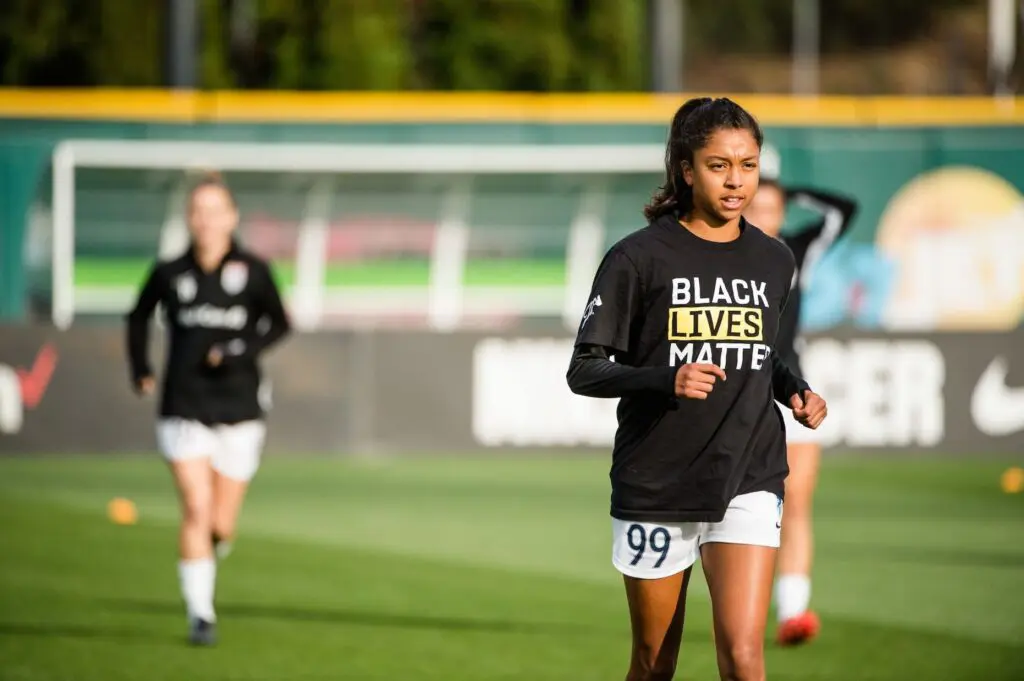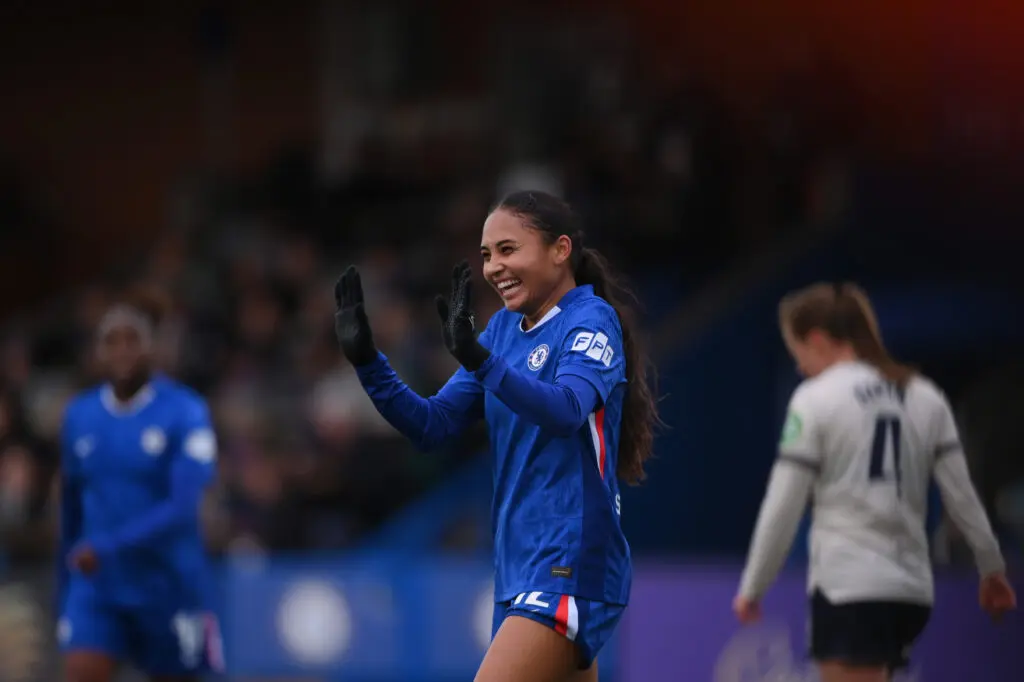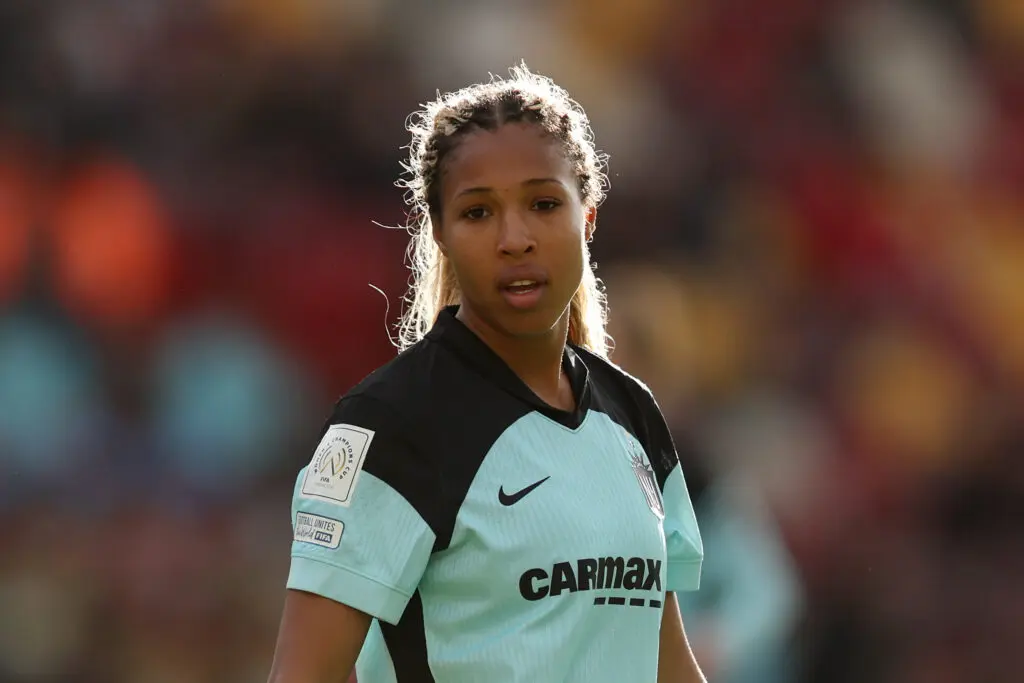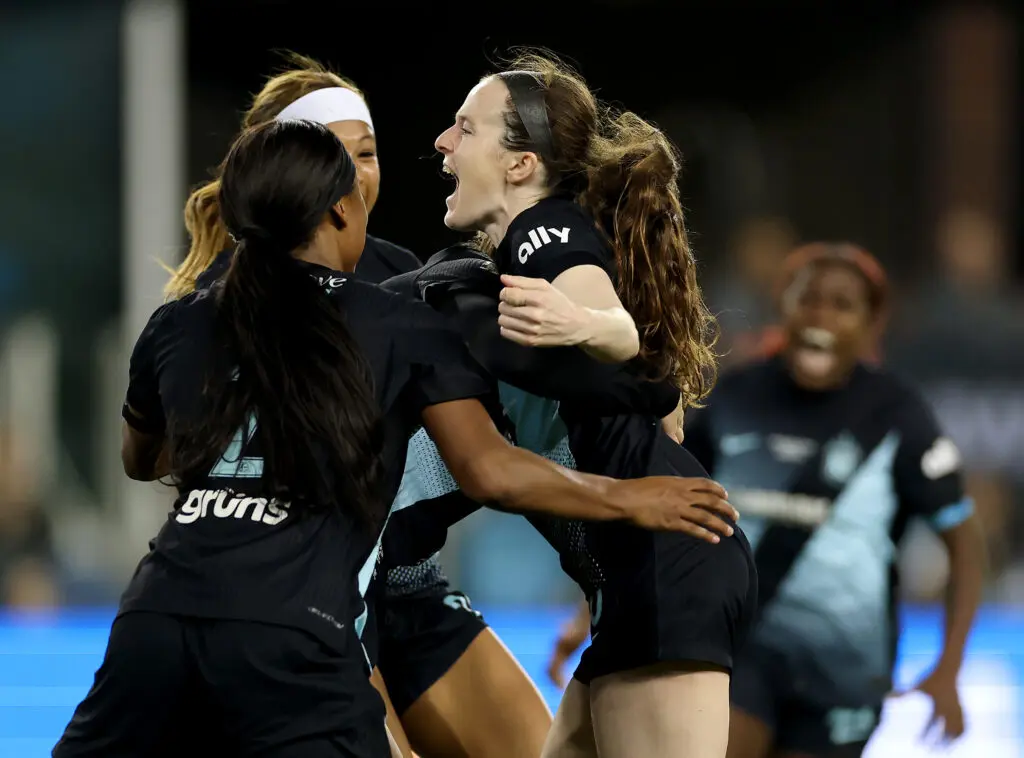Madison Hammond is a defender for OL Reign of the NWSL. After playing collegiate soccer at Wake Forest University, Hammond became the first Native American soccer player to play in the NWSL. Below, Hammond talks to JWS about her rookie season, what it means to her to be the first Native American NWSL player, and how she plans to advocate for others moving forward.
Now that the Fall Series is almost over, what are your thoughts on how it went?
Given the circumstances with COVID and all of the uncertainty, I personally benefited from the Fall Series, especially as a rookie. And, in our pod, we had Portland and Utah, which are two really good teams with full rosters, so it was definitely a good challenge to experience firsthand. It was all high energy and competition — it was so much fun. Overall, I think the Fall Series was great for individual development, but it was also great for team development. It gave us time to get to know our new head coach, figure out our style of play and discover our team chemistry. In my opinion, it was a beneficial two months.
This has been quite the year to be a rookie in the league. When you look back on the last 6 months, what stands out to you?
My mind goes to so many different places when answering this question. For me, being on the field has made me realize how much potential I have and how much room I have to grow as a professional athlete. It wasn’t a fake rookie season, but it felt like that in a way. I had an opportunity to really put myself out there and not feel as much pressure. The time also helped me learn to be ready for anything. I feel like my entire life has been very cookie cutter, but now I’m just trying to learn to take things as they come in terms of soccer.
Off the field, what stuck out most to me, during this time, is that people care about what I have to say — not just about sports, but about what it’s like to be a female athlete in sports, a Black athlete in sports. It’s really been eye opening for me to realize that even though I’m a rookie, even though I’m really young, I still bring something of value to this industry and this sport. I think that’s really exciting.
You are the first Native American player in the league. What does that mean to you?
For me, being the first has been a very humbling experience. When you look at other people who have been the first of anything, it’s like, “Oh, that is so cool.” But, I don’t look at myself in that way. Maybe it’s because I’m only 22 years old and I’m still trying to figure out how to operate as a professional athlete. Even in this short amount of time, though, having people reach out and be inspired by my story has inspired me in reaction. It motivates me to keep working hard because people are noticing and it’s actually having an impact on people. It’s kind of mind blowing to be honest.
We’re so proud of you, @gohaamm, and can’t wait to cheer you on more in the @NWSL! #ProDeacs | #GoDeacs ????
— Wake Forest Sports (@DemonDeacons) September 15, 2020
pic.twitter.com/Vn9W782wMO
You’ve talked before about your experience attending a predominantly white school (Wake Forest University) and learning to speak up about your Native American background and experience. The NWSL is a predominantly white league. Has it been a similar experience in terms of entering a space where not a lot of people likely understand Native American culture?
When I went to Wake, it was almost as if I operated in a space where my racial identity was an experience that I was undergoing myself. Even though I put myself in places to have conversations with people about racial diversity and racial inclusion on campus, no one really asked me how I felt about certain things. No one sat down and asked me about what it’s like being a Native American.
Now, on my team, it’s really different. I feel fortunate in that, with everything happening with the Black Lives Matter movement, there have been more talks about diversity and inclusion. During the Challenge Cup, we had a lot of discussions surrounding the Black Lives Matter movement and some of my teammates would look to me and ask, “Well, you’re having these experiences as a Black woman. What about as a Native American woman?” There were some moments where I was almost surprised, like, “Well, I’m not really sure how I felt. I haven’t ever been asked to think about it.” I think it’s been really positive. I want people to understand that if they’re going to care about me as a teammate, as a friend, as a representative in this league, then they should also care about my personal experiences outside of just soccer.
You’ve said that moving across the country at an early age made it difficult to maintain ties with your Native American culture. What are you doing now as an adult to keep those ties?
I’m interested to know what images pop up in people’s heads when I tell them that. What does it look like to lean back into your Native American culture? For me, it’s just having more conversations with my family and leaning back into a lot of our own beliefs. It’s very similar to religious beliefs, almost. It’s something that’s very spiritual. I’m trying to learn our language which is difficult because it’s only spoken, it’s not written down. My grandma is the only person in my immediate family who speaks fluently.
I think I’m just trying to be the best advocate for myself and for Native American communities as I can. I’m an N7 ambassador, which is a branch of Nike that is a fund for indigenous communities and athletes. I’m hoping that through different forms of outreach, I can keep telling stories that are authentic representations of Native American communities. I want to start breaking down those really old stereotypes that have permeated American culture since forever.
How are you planning to use your platform moving forward to encourage more Native American youth to see that they have a future in professional soccer?
Right now, my biggest focus is just laying the foundational groundwork and making sure that I’m advocating as best as I can. I hate to admit it, but social media is so influential in helping me to speak up on things that matter. The things that matter to me right now are supporting the Black Lives Matter movement, supporting voter registration and supporting voting. For me, it’s both about using my platform to advocate for those things, but also making sure that I’m performing on the field and being a good teammate.
At the end of the day, this is my profession and I want to be a good soccer player. I want kids to see that in order to be the best, you have to be playing at the highest level. Overall, I want to lay the groundwork, be my authentic self, and advocate for the things I believe in.
Cheers to Madison Hammond (@gohaamm) on her #NWSL debut for @OLReign yesterday! ⚽️
— Billie Jean King (@BillieJeanKing) September 28, 2020
She is the first Native American athlete to play in the league.
You have to see it to be it! #Trailblazer https://t.co/u0ySx6qrMu
What was your reaction when you saw that tweet from Billie Jean King? That must’ve been unreal.
It was so unreal. I thought it was a fan account. I refreshed my Twitter app three or four times, I was so surprised. Even once the dust settled, I thought it was so cool that somebody with such a huge platform was recognizing me and validating Native American people. With COVID, Native American communities have been hit so terribly and it hasn’t reached mainstream media. So for there to be even just a little bit of happy news, I think it was really important.




